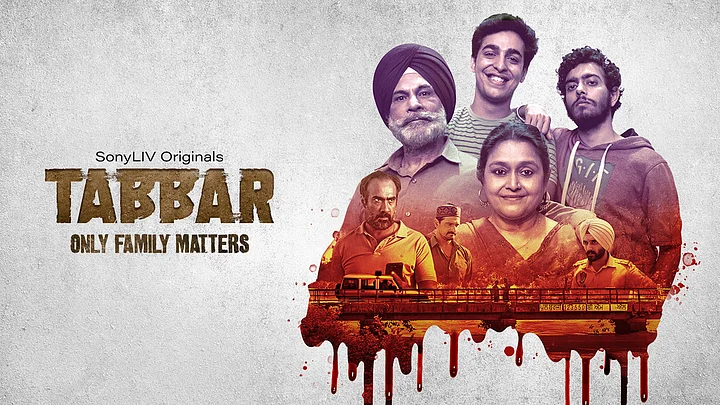Alert: This piece on 'Tabbar' contains spoilers
While magisterial works such as Silence of The Lambs and The Sixth Sense involve psychology in their plots, Tabbar is masterly in how it rubs circumstance against human psychology to birth the plot. Starring Supriya Pathak and Pavan Malhotra, and streaming on SonyLiv, Tabbar is hands down the best Indian series of the year.
The opening image of Tabbar is of a car in the city outskirts, a funeral pyre and a woman trying to commit suicide. A most apposite opening for five hours of a roller coaster ride as a family comes to terms with a new reality which threatens their sober middle class existence.
The theme of Tabbar is stated fast with least verboseness as the family awaits the visit of their elder son Happy, an IPS aspirant who studies in Delhi. Mom, dad and the two sons have just come together as family when we come to know that Happy has mistakenly brought along the bag of another man from the airport. Happy returns the bag to the man. But the inciting incident has already happened with the bag before it is returned. Soon an incident at gunpoint becomes a catalyst for the father (Pavan Malhotra), who decides to save his family from the circus of criminal law, at all costs and by insane acts.
When the plot of Tabbar enters a state of debate, a deep stench is exuding from the family’s workplace. The debate and the stench end at the same time as the family decide to stay on the wrong side of the law and dispose of the dead body. Thus starting a tale of hallucinations, panic and anxiety as the camerawork and the sound design work to make the audience walk through engaging mind spaces of incessantly dimming lights.
Ajit Sodhi is a powerful businessman and politician whose younger brother is missing. His dreaded executioner Multan is brilliantly written in silence and objectivity. As the story breaks into the second act, the family is trying to carry on with their life, but it has already been narrowed down by Multan. Meanwhile, the younger son (Sahil Mehta) suggests that what they found in the bag should be sold to save the family from blackmail. While Pavan and Supriya are as skillful as it gets, Sahil Mehta deserves a special mention for raising a superlative performance and the prospects of an enduring future in acting.
Powerfully written by Harman Wadala, Tabbar is the rich portrayal of Punjab not seen since the days of Maachis. The novelty of a forthright style of content is spelt out in a scene when the elder son and father are labouring to dispose of a dead body and the terrified elder son tells the younger one on the phone ‘Mummy ki dawai fridge ke upar rakhi hai peele dabbe mein’.
Tabbar’s dialogues are foreboding in their excellence. In one of the scenes Happy’s cousin Lucky is told by his mother ‘Ab yeh daag nahi utrega. Shirt press ho gayi hai’. This scene connects as much with the opening scene as with the climax. A beautiful cinematic rendition, Tabbar is haunted and flanked by a spectacular music score from composer Sneha Khanwalker.
The B story of Tabbar consists of a love triangle involving the elder son Happy, the neighbour’s daughter and Happy’s policeman cousin Lucky. The way the B story’s romance interweaves and evolves with the disturbing realism of the A story, makes for great direction and editing.
Lucky (Paramvir Singh Cheema) is a smart but bullied policeman under the command of corrupt officers. His bullying seems to end by the middle of the story. Yet does it? Around the same time the father (Pavan) breaks into a dance on a rap song inside an ill-lit desi sharaab-khana. This sequence single handedly puts director Ajitpal Singh’s web series on an world-class level. Ajitpal, a Punjabi who grew up during the post 1984 era, experienced a lot of bullying in his formative years as well as disappointments in the media industry due to his lack of command over English language.
In Tabbar, when the bad guys close in, there is not a single instance of predefined antagonism. All of them are circumstantial. A greedy neighbour dreaming of his daughter’s marriage, a family trying to cover its trail, a dreaded strongman doing his minimal duty, a political opponent playing sport, a pair of criminals looking for what was in the bag and a policeman jilted in love due to his cousin. It is during this closing-in of bad guys that we witness an internal bad guy. It’s a memory from the father’s past during his police service years, a memory which caused the father to fail during the inciting incident of this story. This analysis is not a spoiler and it is preferred that the reader witnesses Tabbar for themselves.
The story breaks into its third leg as the family decides to close the chapter by taking what they found in the bag and planting it on Ajit Sodhi itself. One might have already heard of Tabbar’s comparisons with Drishyam. But, such a comparison is wrong and does the job of sidelining a product which is different, bigger and better than the latter. The finale of Tabbar is full of surprises. Besides characters, it uses the classic hourly beep on the Casio vintage wrist watch to power a plot turn. The climax of the story and what it does to the Tabbar (family) is heart wrenching and makes the eight episodes a worthy watch. The show eludes Amazon Prime, Netflix, big fish and large ponds to deliver a memorable Indian family thriller for the Indian OTT.
(The writer is a film creative based out of Mumbai. He contributes on cinema & culture to The Wire, EPW, Indian Express and The Citizen)
(At The Quint, we question everything. Play an active role in shaping our journalism by becoming a member today.)
